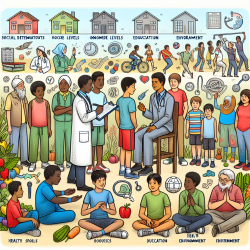Introduction
The ongoing health and social inequities faced by boys and young men of color (BYMOC) in the United States demand urgent attention from health practitioners. The research article, Reducing health inequities facing boys and young men of colour in the United States, provides a comprehensive overview of the challenges and opportunities in this field. By understanding these insights, practitioners can enhance their skills and contribute to reducing these inequities.
Understanding the Challenges
BYMOC face a myriad of challenges that affect their health and social outcomes. These include limited access to health and social services, poor educational outcomes, over-representation in the child welfare and criminal justice systems, high rates of unemployment, and risky health behaviors. These challenges are compounded by systemic issues such as racism and intergenerational trauma.
Opportunities for Practitioners
Practitioners can leverage several strategies to improve outcomes for BYMOC:
- Strengthening the Evidence Base: Engage in research and partnerships to develop evidence-based interventions that address the holistic health needs of BYMOC.
- Reducing System Fragmentation: Collaborate with national organizations to create coordinated efforts that avoid duplication and maximize impact.
- Promoting Connectivity: Build networks and alliances to enhance resource sharing and support for BYMOC-focused initiatives.
- Changing the Narrative: Shift from deficit-focused narratives to strengths-based approaches that highlight the potential and achievements of BYMOC.
- Addressing Racism and Trauma: Implement programs that acknowledge and address the impacts of racism and trauma on BYMOC.
Encouraging Further Research
Practitioners are encouraged to delve deeper into the research to understand the nuanced needs of BYMOC. By exploring the intersections of race, gender, and life stage, practitioners can tailor interventions that are culturally and contextually relevant. This requires a commitment to ongoing learning and adaptation of strategies to meet the evolving needs of this population.
Conclusion
Addressing the health inequities faced by BYMOC is a complex but essential endeavor. By implementing the strategies outlined in the research and committing to continuous improvement, practitioners can play a pivotal role in fostering health equity. For those interested in exploring this topic further, the original research paper offers valuable insights and can be accessed here.










